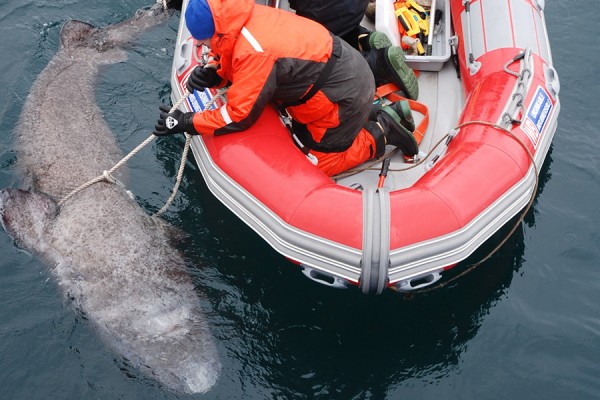 Researchers from the University of Windsor plan to tag Greenland sharks to better understand how to protect them.
Researchers from the University of Windsor plan to tag Greenland sharks to better understand how to protect them.
Greenland sharks are commonly caught as bycatch in northern Greenland halibut fisheries. A UWindsor research team plans to tag individuals of the world’s longest-living vertebrate species, to help create a more detailed picture of how capture may impact populations and develop practices to maximize survival rates.
Liber Ero post-doctoral fellow Brynn Devine and Nigel Hussey, professor in Integrative Biology, received an Ocean Stewardship Fund from the Marine Stewardship Council for nearly $90,000 to tag Greenland sharks in the Eastern Canadian Arctic in order to quantify bycatch survival and mortality rates.
“Unwanted catch is an issue both ecologically and economically,” says Dr. Hussey. “The fate of discarded animals is often unknown with uncertainty for the population status of species if they are caught in large numbers. This is an important issue which resource managers and industry wish to address to ensure best practices.”
As a common bycatch species in northern fisheries, Greenland sharks are vulnerable to capture in a variety of gear types, including trawls, longlines and gillnets. Using pop-up satellite archival tags, the Hussey Lab team will remotely assess survival of bycaught sharks released in varying degrees of health, by providing data on depth, temperature, and swimming behaviour of individual sharks for months following their capture.
This research will quantify survivorship and mortality through tagging, explore fishing practices to reduce bycatch, and develop protocols for safe handling and release. These results will generate mortality estimates essential for sustainable fisheries management.
“Working directly with industry stakeholders will enable us to collect real-time data within normal fishing operations and utilize at-sea fisheries observers for long-term tagging to minimize need for additional researchers aboard,” says Dr. Devine. “The tools for achieving sustainable fisheries are often available, but the certification (from the Marine Stewardship Council) will help provide the incentive to implement these tools to work toward sustainable fisheries management.”
Greenland sharks may take 150 years to reach maturity. The shark is currently listed as a “near threatened” species as designated by International Union for Conservation of Nature, but many data gaps prevent more thorough assessments.
“There are still many unknowns about the basic biology, physiology, ecology, and behaviour of this understudied and long-lived deep-water shark,” says Devine. “I’m excited to receive funding for this project that will help us understand what effect encountering fishing gear may have on local populations.”
The 2020 Ocean Stewardship Fund grants focus on reducing impacts on threatened species and tackling abandoned fishing gear, known as “ghost gear.” UWindsor’s project includes considerable additional funding from WWF-Canada and the Nunavut Fisheries Association.
—Sara Elliott
